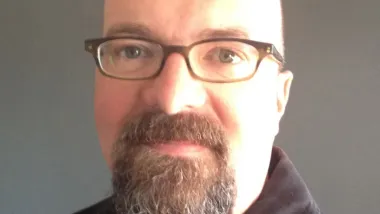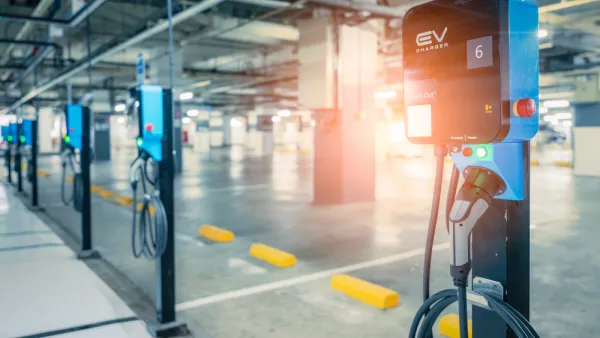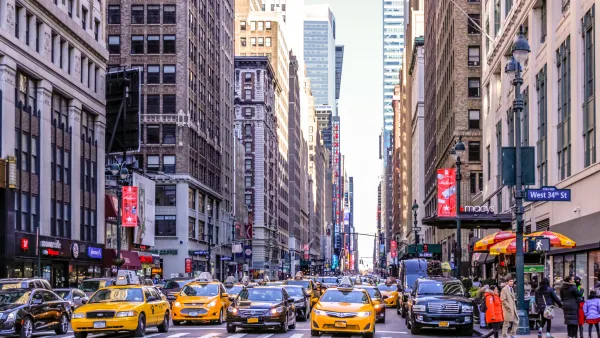David Foster Wallace's commencement speech, now a viral video, misses an essential truth.
The late David Foster Wallace, author of Infinite Jest, apparently gave a commencement speech at Kenyon College in 2005 - now circulating as a fully-produced viral video (below). I ran across it when a Facebook friend shared it with me, with the explanation, "I know a zillion people have already shared this, I just needed to hear it again today and thought you might, too."
The speech begins with a short parable about two young fish swimming along, and an older fish swims by and says, "Morning boys, how's the water?" The younger fish swim along, and eventually one of them says to the other, "What the hell is water?"
Foster Wallace says the reason he starts with this parable is "merely that the most obvious, important realities are often the ones that are hardest to see and talk about." So what is the important reality he has to share? He asks you to consider the following inevitable truth about adulthood:
"You get up in the morning, go to your challenging, white-collar, college-graduate job, and you work hard for eight or ten hours, and at the end of the day you're tired and somewhat stressed and all you want is to go home and have a good supper and maybe unwind for an hour, and then hit the sack early because, of course, you have to get up the next day and do it all again. But then you remember there's no food at home. You haven't had time to shop this week because of your challenging job, and so now after work you have to get in your car and drive to the supermarket. It's the end of the work day and the traffic is apt to be: very bad. So getting to the store takes way longer than it should, and when you finally get there, the supermarket is very crowded, because of course it's the time of day when all the other people with jobs also try to squeeze in some grocery shopping. And the store is hideously lit and infused with soul-killing muzak or corporate pop and it's pretty much the last place you want to be but you can't just get in and quickly out; you have to wander all over the huge, over-lit store's confusing aisles to find the stuff you want and you have to manoeuvre your junky cart through all these other tired, hurried people with carts. (...)
Then you have to take your creepy, flimsy, plastic bags of groceries in your cart with the one crazy wheel that pulls maddeningly to the left, all the way out through the crowded, bumpy, littery parking lot, and then you have to drive all the way home through slow, heavy, SUV-intensive, rush-hour traffic..."
And the conclusion Foster Wallace draws from this situation he sets up? That this, the supermarket, the streets, the soul-crushing atmosphere, the people in it - this is the "water" that makes up our existence, and our natural default setting is to be personally annoyed by it all. But what if we looked beyond our personal needs and saw the depth of our surroundings, particularly the people around us? Rather than hating them for being inconvenient, perhaps we could look deeper into their souls and understand they are part of our true environment?
Here's where I lost it. Sure, we should all take a chill pill and learn to respect the people around us. But I got into urban planning for the very thing that this video tells us we must accept: that the "water" around us is a given. That every day we should get in our cars for an uncomfortable commute, take an hour of our life driving to a big megamart superstore and drive home. We CAN change the built environment, and urbanists are working every day to convince people that if they just left the car in the garage sometimes and we change the way we build then you can have a stress-reducing walk to a local specialty shop for your dinner, or a takeout restaurant, or maybe take your bike for a quick ride down a tree-lined street to the streetcar to work. If we all lived a little closer together and developed a mix of uses (retail, homes, office) rather than isolating each one of those uses we wouldn't spend every day chained to our automobiles and raising our blood pressures.
And that's why I'm so glad to have recently joined the staff of the Congress for the New Urbanism. I've found that CNU members are the most fully engaged with changing the proverbial water we swim in for the better. CNU 21 is only 3 weeks away now, and if you want to be a part of a highly stimulating crowd of forward-thinking urbanists I encourage you to come. I'm obviously biased, but I've always found the yearly Congresses significantly more engaging than the APA conference. I often find APA sessions depressingly focused on the trenches, while CNU is taking an intelligent, design-centered, big picture view of what makes cities work. It's not to late to register at www.cnu21.org and do something to change your water.

Analysis: Cybertruck Fatality Rate Far Exceeds That of Ford Pinto
The Tesla Cybertruck was recalled seven times last year.

National Parks Layoffs Will Cause Communities to Lose Billions
Thousands of essential park workers were laid off this week, just before the busy spring break season.

Retro-silient?: America’s First “Eco-burb,” The Woodlands Turns 50
A master-planned community north of Houston offers lessons on green infrastructure and resilient design, but falls short of its founder’s lofty affordability and walkability goals.

Test News Post 1
This is a summary

Analysis: Cybertruck Fatality Rate Far Exceeds That of Ford Pinto
The Tesla Cybertruck was recalled seven times last year.

Test News Headline 46
Test for the image on the front page.
Urban Design for Planners 1: Software Tools
This six-course series explores essential urban design concepts using open source software and equips planners with the tools they need to participate fully in the urban design process.
Planning for Universal Design
Learn the tools for implementing Universal Design in planning regulations.
EMC Planning Group, Inc.
Planetizen
Planetizen
Mpact (formerly Rail~Volution)
Great Falls Development Authority, Inc.
HUDs Office of Policy Development and Research
NYU Wagner Graduate School of Public Service




























